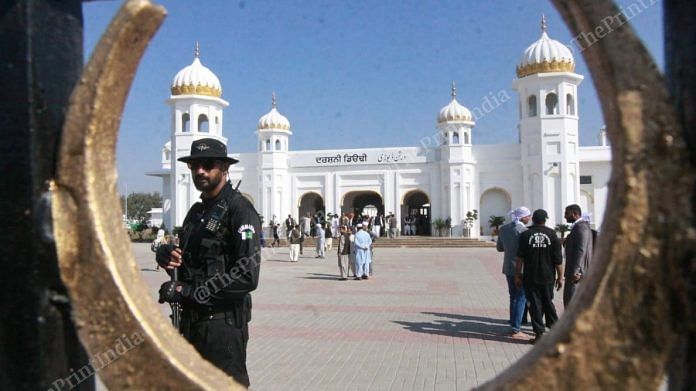The four-km-long Kartarpur corridor linking Dera Baba Nanak in Punjab with Kartarpur Sahib Gurdwara in the adjoining Narowal district in Pakistan, which was closed in March 2020 due to the coronavirus pandemic, has opened again after a delegation of BJP leaders met Prime Minister Narendra Modi. Whether it will open possibilities of peace between India and Pakistan or pose more challenges to the security establishment will be known as the corridor becomes operative.
Many BJP leaders, including Union Home Minister Amit Shah, Punjab Chief Minister Charanjit Singh Channi and his predecessor Captain Amarinder Singh have welcomed the gesture and the entire Punjab cabinet is likely to visit the Kartarpur Gurdwara soon. Meanwhile, the Pakistan government-operated website, kartarpurcorridor.com.pk, lauds the role played by Congress leader Navjot Singh Sidhu in the opening of the corridor, saying, “The idea was shared with the Indian legend Sikh cricketer Sardar Navjot Singh Sidhu who attended the ‘Swearing In’ ceremony of Prime Minister of Pakistan. On 28 November 2018, Prime Minister Imran Khan and Navjot Singh Sidhu attended the Ground Breaking Ceremony of Kartarpur Corridor.”
A potential security challenge
The reference to Sidhu by Islamabad comes at a time when he has turned out to be the most controversial figure in Punjab politics. With election to the state assembly just four-five months away, every political party needs to fill its magic hat with sufficient credit points to pull out during the ensuing campaign. Given the religious importance of the corridor and the extent of goodwill it will generate among the voters, it is natural that political parties would not like to miss the opportunity to be in the limelight when the pilgrims start crowding the corridor.
What could be a prospective vote bank for the politicians, then, could well turn out to be a potential security challenge for India. Months before the talks regarding opening of the corridor were in progress, then-Punjab CM Amarinder Singh had warned of serious security challenges. While it is a religious matter for India, Pakistan has a disruptive motive, he had suggested. He was highly suspicious of the intention of Pakistan Army chief General Qamar Javed Bajwa in hogging the limelight with a view to do something sinister even as PM Imran Khan talked of peace. “Corridor, which was a matter of devotion for the Sikhs, there was a need to exercise caution. Pakistan is doing it with a different intent, which is not at all aimed at promoting peace,” he had warned.
Needless to say, security agencies kept a close watch on the corridor and monitored every movement of pilgrims. There were intelligence reports (provided by the Border Security Force) of training camps for terrorists coming up in Shakargarh and Norowal, very close to the Gurdwara. Although there were not many possibilities of a terror attack, the idea behind these camps could have been to facilitate terrorists infiltrating the pilgrims’ jatha and entering Punjab. The closure of the corridor due to the pandemic could have foiled the infiltration attempts. The security agencies should monitor the area and keep a strict vigil over the situation. Any untoward incident while the pilgrimage is in progress or during the electioneering could prove to be disastrous.
Also read: Kartarpur and Khalistan: Why Pakistan Army has been so eager to open corridor with India
Political need on both sides
It is important for every new civilian PM of Pakistan to extend a hand of friendship with India and substantiate it with adequate photo-ops. Kartarpur corridor was one such opportunity for Imran Khan. Outlining his idea of ‘Naya Pakistan’, Imran Khan had famously said: “If they (India) take one step towards us, we will take two, but at least need a start.” But Foreign Minister Shah Mehmood Qureshi, either inadvertently or by design, watered down the sentiments saying the PM had bowled “a googly”, thus revealing the real intent behind the Kartarpur corridor.
It is not only the civilian prime ministers of Pakistan who need to go through the ritual of ‘India-friendly’ rhetoric. Historically, every Indian PM, including Modi, has tried to extend the proverbial olive branch to Islamabad and met with very little success in building the utopian peace bridges.
It is no secret that intelligence agencies in Pakistan were supporting the pro-Khalistani elements and generously funding the infamous “Referendum 2020”, which appears to have been a total flop and run out of steam. Even before the Kartarpur corridor was available, Sikh pilgrims coming to Pakistan (under the 1974 Bilateral Protocol on Visits to Religious Shrines) from Canada, the UK, Germany or any other European country, were closely tracked as prospective pro-Khalistan activists and supporters. In fact, a section of the press in Pakistan widely reported that a ‘referendum’ was held last month in London, (on 31 October coinciding with the 1984 anti-Sikh riots in India). The sham of ‘Punjab Independence Referendum’ was organised by a little-known Punjab Referendum Commission (PRC) ostensibly to garner support for Khalistan.
Going by the emerging regional imbalance arising out of the Taliban’s takeover of Kabul, Islamabad and Beijing inching closer to the Taliban regime and the regional security situation turning scary to say the least, New Delhi needs to keep a hawk’s eye on not just the Kartarpur corridor but on the entire western and northern border. It is doubtful if Kartarpur corridor will ever become the much-touted peace corridor.
The author is the former editor of ‘Organiser’. He tweets @seshadrichari. Views are personal.
(Edited by Prashant)



